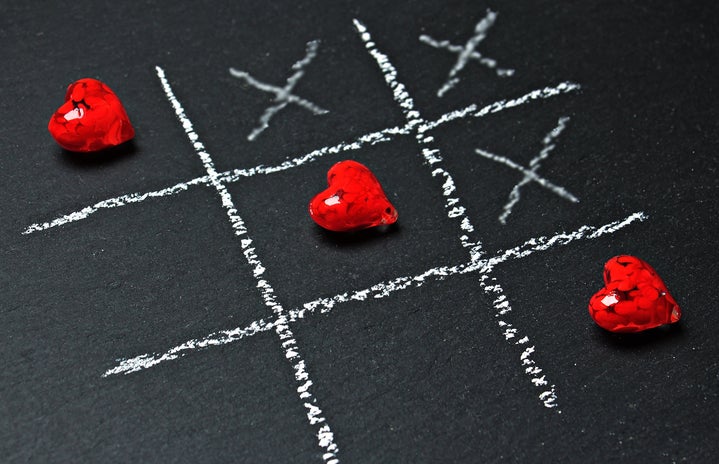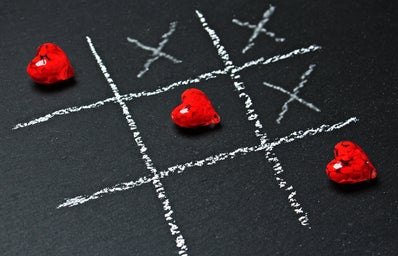“You are a match.” Announced Bumble, one of the dating apps I’d decided to use with the excuse to find the love of my life. Our profiles lacked shared interests, but we liked how the other person looked. It was at 21 years old that I had the start of my first romantic relationship.
My partner was not the first person I ever met through online dating. I was in a period of my life when I needed some excitement. Having moved from Mexico to Canada for my education, I’d been grappling with a crushing sense of loneliness that I thought a romantic partner could fill. The free dinners were also a plus.
Dating, under the modern capitalist model, works on the premise of “mutually beneficial exchange.” Eric Fromm, in his book The Art of Loving , named the dating market as the “personality market” where a person advertises themselves to be as lovable as possible. Dating apps have exploited this market to obscene lengths.
For months, I kept using the apps, collecting people as prizes. I objectified myself, commodified people, and categorized them on a surface level, and I had no plans on stopping, not until I found “the one”. OliSUNvia, a Canadian philosophy student and YouTuber, in her video Our Conception of Love is Messed Up says, “You have fallen in love when you find the optimal sweet spot between social value and desire for you. This strategic exchange doesn’t treat people as people.” Just like walking through the cereal aisle, I valued my options for what they could give to me. Cereal satisfies your desire for an easy meal, under this mindset, love becomes what will satisfy your desire to not be lonely.
In my opinion, dating apps are how the capitalist market is pushed onto people, forcing you to become the product. They sell something intrinsically vulnerable and human: connection. Or at least the opportunity of it. It’s crucial to remember that dating apps don’t make money if you find “the one.” The algorithm is designed to overwhelm you with options so that you are never truly satisfied. These apps can also hide your profile from other people, messing with your self-worth and self-esteem in hopes that you buy the premium version to increase your chances of connection.
The app Tinder, in particular, has been criticized for using the Elo rating system, which was originally designed to rank chess players against each other. When Elo ranks chess players, it calculates the probability of a player defeating the other. If a low probability player defeats a “strong” (or higher ranked) player, then the rating system would self-correct and assign a higher and lower value, respectively. By using this system on a dating app, you immediately assign a value to a person (which often reflects euro-centric societal standards i.e. white, thin, etc). Once a substantial number of people have discarded your profile on Tinder, the algorithm won’t show your profile anymore.
Don’t be mistaken, human relationships are more complicated than a successful business model. No matter how many people deem you as desirable, it will not create a successful romantic relationship. I learned that the hard way when I realized the people I dated never once looked at me as a person. I was “the exotic girl” who could increase their social value online.
But my partner checked all my boxes. He was tall, handsome, well-spoken, studied a career I deemed valuable, and was a straight white man who didn’t say anything immediately racist or misogynistic on the first date. And what’s more, he was curious about me. We had deep conversations, talking about our dreams, hopes, and aspirations. I was intrigued. And for the first time, I felt the so-called butterflies in my tummy.
We tried to learn how to love each other appropriately. I realized that this person and I had quite different needs and views in life, but I made a bunch of excuses. I told myself that we have different backgrounds and cultures and that things would get better. I really wanted to be loved, and I was afraid I wouldn’t find the butterflies again, so I gaslit myself into believing that love is sacrifice. At the time, I didn’t believe that the algorithm could be wrong.
One month after our first anniversary, this person confessed they had never truly loved me. At least not in the same vein I’d loved them. And he was curious about the other options out there. I’d been nothing more than the training girl for this person’s future. Like the emptied cereal box, it was time to go shopping once more.
I contemplated whether my social value had indeed plummeted. Most heterosexual women envision ourselves as the heroine in a classic romance novel, finding everlasting love. However, even that perception, I realized, was objectifying and inherently misogynistic. I understood why the immediate action after a breakup is to become more attractive, to have a “glow-up”. We want to prove that our price in the market is still high or attempt to make it higher. I wondered if I had let my market price go too low. I’d long stopped being a commodity. I’d become a person. I wanted to be loved as a person.
I shaved my head.
I purposefully decreased my market price in the heteronormative pool and decided that whoever I dated next was going to like me as a person, not a commodity. As the show, BoJack Horseman, says, “One day, you are going to look around, and you are going to realize that everybody loves you…but nobody likes you. And that is the loneliest feeling in the world.” I know that I’m an attractive person in the world of dating apps, but being considered a product is no longer enough for me. I want someone to choose me not for what I can give, but for who I am. I want to fall in love with a person, not the idealized version of one.
My ex-partner and I are no longer in contact. I grieve my past relationship. Some days, I’m scared I have so much love to give, but that no one will receive it. I still don’t know what real, authentic love is. I don’t know if I have made a fool of myself by decreasing my value. Yet, I encourage you to delete the dating apps and stop being a product for these corporations, dating shouldn’t be a commodity, because we all deserve connection and love, even when we are not at our “best”. If your desire to love is not banal or superficial, then you shouldn’t see love as a transaction.


